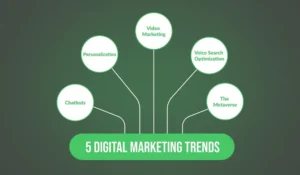The Future of Digital Marketing: Trends to Watch in 2024

As we move into 2024, the landscape of digital marketing continues to evolve at a rapid pace. Businesses, marketers, and consumers alike are witnessing significant shifts that will shape how brands connect with their audiences in the coming year. The future of digital marketing will be defined by several emerging trends, including advancements in artificial intelligence (AI), the rise of immersive technologies, personalized experiences, and privacy concerns. For businesses aiming to stay competitive in an increasingly digital world, it’s essential to understand these trends and adapt to the changing environment.
1. AI-Driven Marketing Automation
Artificial intelligence (AI) has already begun transforming the way businesses engage with their customers, and in 2024, its impact will only grow. AI-driven marketing automation tools are enabling brands to streamline their campaigns and improve efficiency. These tools analyze large volumes of data to predict consumer behavior, personalize content, and automate repetitive tasks.
One of the most exciting developments in AI-driven marketing is predictive analytics. By leveraging machine learning, AI tools can predict what consumers are likely to purchase next, allowing businesses to craft highly targeted marketing campaigns. Additionally, AI-powered chatbots and virtual assistants will continue to enhance customer service by providing immediate, 24/7 responses to consumer inquiries.
For marketers, embracing AI-driven automation means more personalized and efficient marketing strategies, from content creation to campaign optimization.
2. The Growth of Voice Search and Smart Devices
Voice search has already begun reshaping how people search for information online, and this trend is expected to accelerate in 2024. With the widespread adoption of voice assistants like Amazon Alexa, Google Assistant, and Apple Siri, consumers are increasingly using voice commands to interact with brands and discover products.
For digital marketers, this shift means optimizing content for voice search. Unlike traditional text-based searches, voice queries tend to be longer and more conversational. Brands will need to adjust their SEO strategies to cater to these changes, focusing on long-tail keywords and natural language processing to improve their visibility in voice search results.
Additionally, the proliferation of smart devices, from connected home assistants to wearable tech, presents new opportunities for brands to engage with consumers in innovative ways. Marketers will need to consider how their content and advertisements can be integrated into these connected ecosystems.
3. Immersive Technologies: AR and VR
Augmented reality (AR) and virtual reality (VR) technologies are no longer just the domain of tech enthusiasts and gamers. In 2024, these immersive technologies are set to become a powerful tool for digital marketers looking to create engaging and interactive experiences for consumers.
AR is already being used by brands like IKEA and L’Oreal to allow customers to visualize products in their homes or try on cosmetics virtually. As the technology continues to improve, more businesses will adopt AR to enhance their marketing efforts. For instance, AR ads can allow consumers to interact with products in real time, providing an immersive shopping experience that can drive conversions.
Virtual reality, on the other hand, offers a more immersive, 360-degree experience. For industries like travel, real estate, and entertainment, VR can provide consumers with virtual tours, allowing them to explore destinations or properties without leaving their homes. As VR technology becomes more accessible, more brands will use it to create unforgettable experiences for their audiences.
4. Personalization and Hyper-Personalized Marketing
Consumers today expect more personalized experiences from the brands they engage with. In 2024, hyper-personalization will become a dominant trend in digital marketing. Advances in data analytics, machine learning, and AI will allow marketers to create highly individualized experiences based on consumer behavior, preferences, and past interactions.
Personalization isn’t just about using a customer’s name in an email or recommending products based on previous purchases. In 2024, brands will leverage data to deliver more contextually relevant content across multiple touchpoints, from website interactions to social media engagement. Personalized video content, dynamic landing pages, and targeted email campaigns will become the norm, helping brands build stronger relationships with their audiences.
5. Privacy and Data Protection
As data privacy concerns continue to rise, marketers will need to be more transparent about how they collect and use consumer data. The introduction of stricter data protection regulations, such as GDPR in the EU and similar laws in other parts of the world, means that brands must prioritize user consent and data security.
In 2024, digital marketers will need to shift toward privacy-first marketing practices. This includes focusing on first-party data collection (data collected directly from customers) and being transparent about how that data is used. Consumers are becoming more selective about sharing their information, and brands that respect privacy will earn consumer trust and loyalty.
6. Sustainability and Ethical Marketing
In 2024, consumers will increasingly expect brands to be more socially responsible and environmentally conscious. Sustainability is no longer a niche concern; it has become a key factor in purchasing decisions. Digital marketers will need to integrate sustainability into their brand messaging and align their marketing strategies with ethical practices.
From reducing carbon footprints to supporting social causes, brands that demonstrate a genuine commitment to sustainability will resonate with consumers, especially the younger generation. In 2024, digital marketing will not only focus on selling products but also on fostering a sense of social responsibility and community.
Conclusion: Adapting to the Future
The future of digital marketing in 2024 is bright, with exciting opportunities for brands that embrace emerging technologies and trends. AI, immersive technologies, personalization, and privacy concerns will define the digital marketing landscape. As businesses adapt to these changes, they will need to be agile, customer-focused, and innovative to stay ahead of the curve. For marketers, the key to success will lie in their ability to leverage these trends while maintaining a strong commitment to customer trust and experience. By doing so, they can build lasting relationships with their audiences and thrive in an increasingly digital world.






